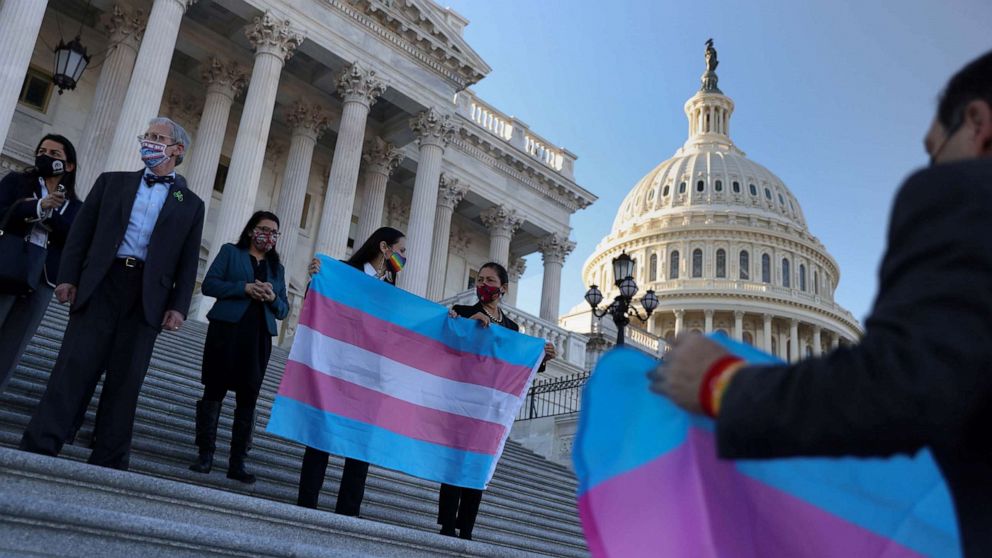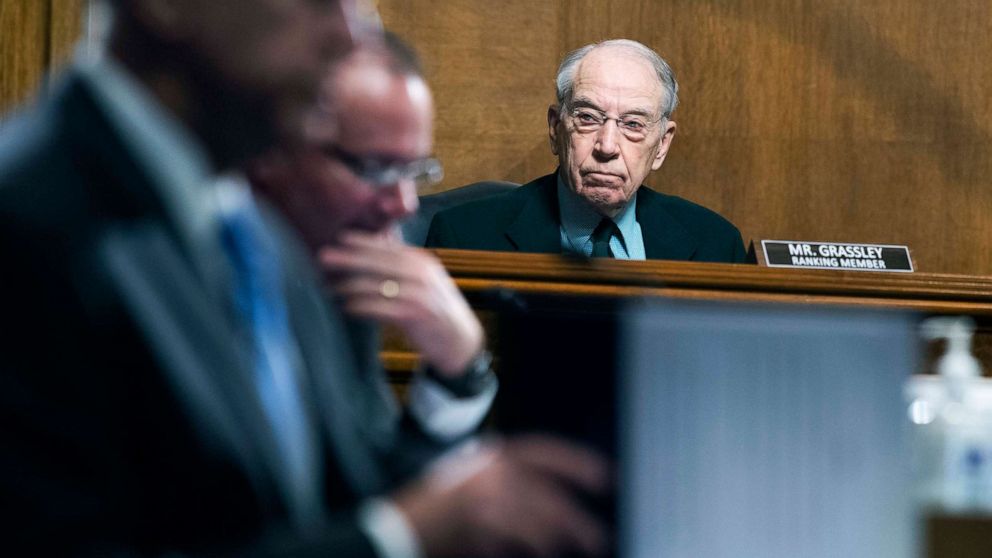国会山——里程碑式的立法,将扩大联邦民权法,以禁止同性恋、双性恋、变性者和两性人在公共场所的性别歧视,周三在参议院举行了首次听证会,这是该立法成立五年多以来的首次众议院最近的一段话。
这项名为《平等法案》的法案的支持者从未像现在这样被民主党控制所有联邦权力杠杆的成功机会所鼓舞,但司法委员会周三的会议揭示了民主党和保守派之间的明显对立。
双方基本上都在谈论对方,这表明该法案要获得必要的10名共和党人(如果民主党多数派保持团结的话)在参议院通过将是一场艰苦的斗争。
司法委员会主席迪克·德宾·迪尔。在听证会开始时,他指出了美国男女同性恋、双性恋和变性者群体取得的历史性进步,包括最高法院最近做出的确立婚姻平等和免受就业歧视的裁决,但他补充说,他们“在美国仍然面临着各种法律保护”。一些州,如伊利诺伊州,全面保护[LGBTQ]个人免受歧视。其他人远远落在后面。”
《平等法案》将确保美国男女同性恋、双性恋和变性者在公共住宿、教育、联邦资助项目、就业、住房方面免受歧视...和陪审团服务。
21个州有防止性取向和性别认同歧视的法律,但全国最大的同性恋、双性恋和变性者权益倡导组织人权运动(HRC)援引了已经在2021年州立法会议上提交的82项法案,这是一个历史新高,它说这将对跨性别美国人产生负面影响。

汤姆·布伦纳/路透社
2021年2月25日,众议员黛比·哈兰德在国会山的民主党同事旁边举着一面变性人骄傲旗。
周三,《平等法》的批评者描绘了一幅暗淡的画面,称该法案如果成为法律,将剥夺对宗教机构和信仰组织的法律保护,并可能摧毁妇女和女孩的体育运动,该法案的支持者强烈否认了这一说法。
犹他州参议员李政颖说:“这种语言相当宽泛,几乎不可避免地会使这项法律在宗教机构中占据更重要的位置。”。
根据法律,公共住宿包括“提供展览、娱乐、休闲、锻炼、娱乐、公众集会或公共展示的体育场或其他场所或机构”以及“提供商品、服务或项目的任何机构,包括商店、购物中心、在线零售商或服务提供商、沙龙、银行、加油站、食品银行、服务或护理中心、庇护所、旅行社或殡仪馆,或提供医疗保健、会计或法律服务的机构。”
一位反对者坚持认为,这项措施将重新定义宗教和信仰机构为公众服务时可以做些什么,并表示,1993年《宗教自由恢复法案》(RFRA)规定的法律保护将被取消,这可能会导致大量诉讼。该法案规定,政府不得过度增加个人宗教活动的负担。
“教堂、犹太教堂、寺庙、宗教学校、施粥所、妇女庇护所,都将受到政府的强制。道德和公共政策中心的玛丽·赖斯·哈森作证说。
但威斯康星州参议员塔米·鲍德温(Tammy Baldwin)不同意这一观点,他指出,各州已经通过了法律,按照《平等法》的要求行事。
“这些变化不是要从别人那里拿走什么,而是要确保我们都能获得所有美国人的相同权利,”他补充说,每当这一群体的公民取得进步,反对者就会预测永远不会实现的灾难。
鲍德温说:“每次我们这样做的时候,都有人预测到了灾难,但灾难从未发生。”。
“我们知道,法律从1970年开始就被记录在案,天没有塌下来。人权委员会主席阿方索·大卫(Alphonso David)说:“我们知道,民权法律保护了男女同性恋、双性恋和变性者——伊利诺伊州、明尼苏达州、弗吉尼亚州、新墨西哥州都有全面的法律——现在声称的权利主张在这些州没有实现。”
共和党人周三花了大量时间询问立法可能对女孩体育产生什么影响,从参议员约翰·肯尼迪(John Kennedy)提出的不寻常的问题。关于是否允许“一个被认为是女孩的男孩”和女孩一起洗澡或穿衣,年轻女性是否会因为过度发育的男孩而失去体育奖学金。
一位受共和党邀请的有争议的证人,记者阿比盖尔·施赖尔,严厉地警告说,“它把一个破坏性的球应用于女性运动,因为它坚持任何...他声称自己在大四的任何时候都是女性,也许是在他考虑大学奖学金的时候,他有充分的法律权利进入一线队并承担这些责任。
施赖尔预测了可怕的情况,在这种情况下,男人也可以声称自己是女性,并被关进女子监狱,或者进入受虐妇女庇护所。
“《平等法》除了不歧视之外,不强迫任何人做任何事情。这项立法没有创造一些新的现实。它只是允许跨性别学生在体育运动中不受歧视...NCAA甚至国际奥委会已经允许跨性别运动员参赛,并且已经持续多年了,”大卫争辩道。
共和党参议员林赛·格雷厄姆(Lindsey Graham)表示,他有兴趣尝试达成妥协,他抛出了一个假设,试图得出宗教机构可能在什么时候失去立法保护。
“假设你有一个宗教组织参与世俗体育赛事。这是否足以要求一个宗教组织接受某人的亲生儿子参加体育活动?,”格雷厄姆问大卫。
“从事世俗活动并不能让你成为一个公共住宿的地方,”大卫解释道。“使你成为公共住宿场所的是你是否对公众开放。无论你是否向公众提供商品和服务。如果你决定从事世俗活动,但将这些次要活动限制在你信仰的活动范围内,不向公众开放,那就非常不同了,这是现行法律。”
在所有激烈的言论中,一位目击者,堪萨斯州基督联合教会的会议部长伊迪丝·古菲,提出了一个历史警告,宗教曾经被用作反对被奴役的美国黑人的武器。
“我们都应该能够在一件事上达成一致——法律应该平等地对待我们所有的孩子,上帝的孩子,”古菲说,他14岁的时候首先是同性恋,然后是一个跨性别的人。“我也知道宗教和信仰是如何被用来为奴隶制辩护的,但那是错误的...我认为我们可以从中吸取教训。”

汤姆·威廉姆斯/CQ-通过盖蒂影像公司点名
2021年3月17日,查克·格拉斯利参议员出席参议院司法委员会题为《平等法案:同性恋、双性恋、变性者和两性人的权利是人权》的听证会。
参议员和证人多次将他们自己的个人经历带到讨论中,以支持他们在问题任何一方的立场。
该小组的共和党高级成员、参与体育运动的女性的父亲和祖父查克·格拉斯利参议员认为,“我们需要考虑每个可能受到影响的人的观点”,他说,在考虑修改现行法律之前,国会需要听取医生、无家可归者和家庭暴力设施的居住者、教养机构的意见。
格拉斯利说:“我非常担心这一行为对所有女孩的负面影响。”。
众议员玛丽纽曼,伊利诺伊州。她讲述了她13岁的孩子的痛苦经历,她说,她差点自杀,最后通过治疗发现了自己的真实身份。
“她告诉我们她已经想通了。她告诉我们,‘我不是男孩。“我是一个女孩,我的名字叫伊维·纽曼,”纽曼恳求立法者保护她的女儿。
”(《平等法案》)将确保像我女儿这样的美国人获得与全国其他所有美国人相同的公民权利。仅此而已。关乎平等。我们没有要求任何特别或不同的东西。我鼓励你们所有人不要把宗教武器化,也不要把体育运动的转移注意力武器化。”
16岁的斯特拉·基廷(Stella Keating)是一名高中二年级学生,也是一名推动通过《平等法案》的跨性别活动家,他问立法者:“如果我想在一个不保护我的州上大学,会发生什么?现在,在许多州,我可能会因为变性而被拒绝医疗保健或被驱逐。这怎么可能呢?那怎么连美国人都算?”
尚不清楚包括绝大多数民主党人在内的支持者能否获得将该法案提交总统办公室所需的60票。
拜登将通过平等法案作为他100天议程的一部分,并在上个月的一份声明中重申,“我敦促国会迅速通过这项历史性的立法。每个人都应该得到尊严和尊重,这项法案是确保美国实现我们所有人平等和自由的基本价值观的关键一步。”
在周三的听证会上,在分歧严重的小组中,几乎没有共和党人愿意就该法案进行妥协谈判,支持者们表示,他们知道必须这样做。但是共和党参议员托姆·提利斯(Thom Tillis)确实联系了他的民主党对手。
“我想找到一个折中的办法,一个防止歧视同性恋、双性恋和变性者群体中任何人,任何美国人的办法,但我也想保护美国人,”蒂莉斯说。“我希望我们能够共同努力并取得进展,因为这里存在着真正的挑战。但我觉得,即使是在这次听证会上,尽管问题很有见地,但有时我们还是会互相忽略。”
人权运动、著名的民权组织和其他致力于为立法计划争取支持的组织将重点放在共和党参议员身上,包括犹他州的米特·罗姆尼(Mitt Romney)、俄亥俄州的罗布·波特曼(Rob Portman),他的同性恋儿子几年前导致他放弃反对同性恋婚姻,以及缅因州的苏珊·科林斯,她在上届会议上共同提出了该法案,但当没有做出任何改变来解决她的隐私问题和其他问题时,她退出了。
杜宾主席说,他将努力寻找共同点,但现在是时候对宗教实践施加一些限制了,无论这个问题有多微妙。
“我确实认为,那些想公然歧视并将宗教作为其武器的人已经走得太远了。杜宾说:“我们必须限制他们的能力。”我可能会在历史上提醒我们,三k党不是在烧问号,他们是在烧十字架。他们与一种宗教建立了某种扭曲的联系,上帝禁止任何人购买这种联系。"
Equality Act that would bar LGBTQ, gender identity discrimination faces uphill battle in Senate
Capitol Hill -- Landmark legislation that would expand federal civil rights law to prohibit LGBTQ and gender identity discrimination in public accommodations received its first hearing in the Senate Wednesday more than five years since its inception and afterrecent passage in the House.
Supporters of the bill -- called the Equality Act -- have never been more buoyed by their chances of success with Democrats controlling all of the levers of federal power, but the Judiciary Committee proceeding Wednesday revealed stark battle lines between Democrats and conservatives.
Both sides largely talked past each another, signaling an uphill struggle for the bill to get the necessary 10 Republicans, if the Democratic majority remains united, to pass it in the Senate.
Judiciary Committee Chairman Dick Durbin, D-Ill., at the outset of the hearing, noted the historic advances for LGBTQ Americans, including the recent Supreme Court rulings establishing marriage equality and protection from employment discrimination, but he added they "still face a patchwork of legal protections across America. Some states, like Illinois, comprehensively protect [LGBTQ] individuals from discrimination. Others lag far behind."
"The Equality Act would ensure that LGBTQ Americans are protected from discrimination in public accommodations, education, federally-funded programs, employment, housing ... and jury service," Durbin said.
Twenty-one states have laws that protect against both sexual orientation and gender identity discrimination, but the Human Rights Campaign (HRC), the largest LGBTQ advocacy group in the nation, cited 82 bills filed already in the 2021 state legislative session, a historic high, that it said would negatively impact transgender Americans.
Critics of the Equality Act on Wednesday painted a bleak picture if the bill were to become law, claiming it would strip away legal protections for religious institutions and faith-based organizations and potentially destroy women’s and girls’ sports, a claim the bill's supporters vehemently denied.
"The language is rather significantly broad and would almost inevitably put this law in a position of occupying a more significant place with respect to religious institutions," said Sen. Mike Lee, R-Utah.
Public accommodations, under the legislation, include "a stadium or other place of or establishment that provides exhibition, entertainment, recreation, exercise, amusement, public gathering, or public display" and "any establishment that provides a good, service, or program, including a store, shopping center, online retailer or service provider, salon, bank, gas station, food bank, service or care center, shelter, travel agency, or funeral parlor, or establishment that provides health care, accounting, or legal services."
One opponent insisted that the measure would redefine what religious and faith-based institutions can do if they serve the public, saying that legal protections under the 1993 Religious Freedom Restoration Act (RFRA) -- which says that government may not overly-burden a person’s exercise of religion -- would be stripped away, potentially leading to a flood of lawsuits.
"Churches, synagogues, temples, faith-based schools, soup kitchens, women shelters, will be subject to government coercion. Compromise your religious beliefs or risk endless litigation," Mary Rice Hasson of the Ethics and Public Policy Center, testified.
But Sen. Tammy Baldwin, D-Wis., the first openly-LGBTQ senator, disagreed, pointing to states have have passed laws that do what the Equality Act is seeking to do.
"These changes are not about taking something away from others but about ensuring we all have access to the same rights of all Americans," adding that every time advances have been made for this group of citizens, opponents predict disaster that never comes to fruition.
"Every time we do so, there are those who have predicted calamity but that has never come to pass," Baldwin said.
"We know that laws have been on the books since 1970, and the sky didn’t fall. We know that civil rights laws have protected LGBTQ people -- comprehensive laws in Illinois, Minnesota, Virginia, New Mexico -- and the claims that are being asserted now are not realized in those states," said Alphonso David, HRC’s president.
Republicans focused a significant amount of time Wednesday asking questions about what the legislation might do to girls’ sports, from unusual questions like those from Sen. John Kennedy, R-La., about whether or not it would permit "a boy who identifies as a girl" to shower or dress with girls, to whether young women might lose sports scholarships to overly-developed boys who have transitioned.
One controversial witness invited by Republicans, journalist Abigail Shrier, warned in stark terms, "It applies a wrecking ball to female sports by insisting that any male who ... claims to be female for any amount of time in his senior year, perhaps when he’s eyeing college scholarships, has a full legal entitlement to walk onto the first team and take on of those."
Shrier predicted dire circumstances where men could also claim to be female and be placed in a women's prison or gain access to a battered women's shelter.
"The Equality Act does not force anyone to do anything other than not to discriminate. The legislation doesn’t create some new realities. It simply allows transgender students to not be discriminated against in sports ... The NCAA and even international Olympic Committees already allow transgender athletes to participate and have for years," David argued.
Sen. Lindsey Graham, R-S.C., who said he was interested in trying to work out a compromise, threw out a hypothetical, trying to get at when religious institutions might lose protections under the legislation.
"Let’s say you have a religious organization participating in secular sporting events. Is that enough to require a religious organization to accept somebody’s biological boy playing sports?," Graham asked David.
"Engaging in secular activities does not make you a place of public accommodation," David explained. “What makes you a place of public accommodation is whether or not you’re open to the public. Whether or not you’re providing goods and services to the public. If you decided to engage in secular activities but limit those secondary activities to those of your faith without opening to the public, that is very different, and that’s existing law."
With all of the heated rhetoric, one witness, Edith Guffey, a conference minister at the United Church of Christ in Kansas, offered an historical warning that religion was once used as a weapon against enslaved Black Americans.
"We should all be able to agree on this one thing -- the law should treat all our children, God’s children, equally," said Guffey, whose 14-year old came out first as gay and then as a trans-non-binary person. "I also know how religion and faith were used to justify slavery, but that was wrong ... I think we can learn from that."
Repeatedly, senators and witnesses brought their own personal experiences to the discussion to buttress their own positions on either side of the issue.
Sen. Chuck Grassley, top Republican on the panel and father and grandfather of women who participated in sports, argued, "We need to consider the perspective of everyone who might be affected," saying that Congress needs to hear from physicians, occupants of homeless and domestic violence facilities, correctional institutions before contemplating changes to current law.
"I am deeply concerned about this act’s negative implications for all girls," said Grassley.
Rep. Marie Newman, D-Ill., recounted the excruciating journey of her 13-year old who was near suicide and ended up she said, through therapy, discovering her true identity.
"She told us she had figured it out. She told us, 'I’m not a boy. I’m a girl, and my name is Evie Newman.' Everything had clicked," said Newman, pleading with lawmakers to protect her daughter.
"(The Equality Act) will ensure that Americans like my daughter are afforded the same civil rights already extended to every other American across the nation. And that’s all it’s about. It’s about equality. We’re not asking for anything special or different. I encourage all of you to not weaponize religion and not weaponize red herrings about sports."
One witness, 16-year old Stella Keating, a high school sophomore and transgender activist pushing for passage of the Equality Act asked lawmakers, "What happens if I want to attend a college in a state that doesn't protect me? Right now, I could be denied medical care or be evicted for simply being transgender in many states. How’s that even right? How’s that even American?"
It is unclear if supporters, including the vast majority of Democrats, can garner the 60 votes needed to send the bill to the president’s desk.
Biden made passage of the Equality Act part of his 100-day agenda and reiterated in a statement last month, "I urge Congress to swiftly pass this historic legislation. Every person should be treated with dignity and respect, and this bill represents a critical step toward ensuring that America lives up to our foundational values of equality and freedom for all."
At the Wednesday hearing, few Republicans on the deeply-divided panel seemed open to negotiating a compromise on the bill, something supporters have said they know must happen. But Sen. Thom Tillis, R-N.C., did reach out to his Democratic counterparts.
"I want to find a compromise, one that prevents discrimination against anybody in the LGBTQ community, any American, but I also want to protect Americans," said Tillis. “I hope that we can work together and make progress, because there’s a real challenge here. But I feel like even in this hearing, although the questions were insightful, sometimes we’re talking past one another."
The Human Rights Campaign, prominent civil rights groups, and other organizations fighting to build support for the legislation plan to focus on GOP senators, including Utah’s Mitt Romney, Rob Portman of Ohio whose gay son led to him renouncing his opposition to gay marriage years ago, and Susan Collins of Maine who co-sponsored the bill in the last session but pulled back when changes were not made to address her privacy concerns and other issues.
Chairman Durbin said he would work to find common ground but that the time had come to put some limitations, however delicate the issue, on religious practices.
"I do believe that people who want to blatantly discriminate and use religion as their weapon have gone too far. We have to have limits on what they can do, Durbin said. "I might remind us in history that the Ku Klux Klan was not burning question marks, they were burning a cross. They were making some distorted connection with a religion, and God forbid that anybody would buy that."






